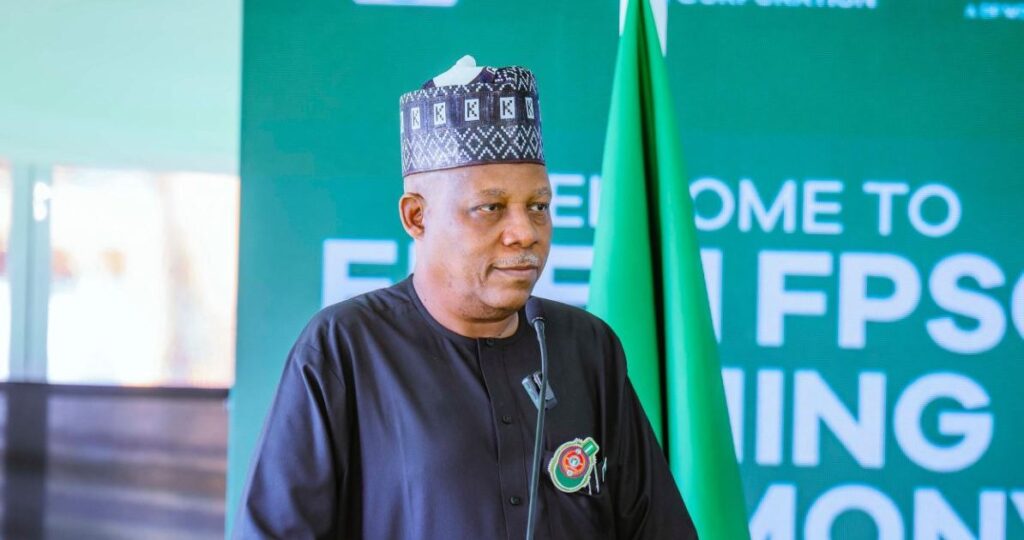Nigeria’s Vice President, Kashim Shettima; Minister of Finance Wale Edun; Governor of the Central Bank of Nigeria, Olayemi Cardoso; and President of the Chartered Risk Management Institute of Nigeria, Kevin Ugwuoke, have called for a nationwide embrace of risk management as a culture, not just a policy tool.
They made the call on Thursday at the 24th Annual International Conference of the CRMI in Lagos, where they insisted that an embrace of a risk management culture will enable the country to weather global shocks.
The CRMI Conference offered a platform for local and international stakeholders to address the world’s most pressing challenges, from climate change and financial volatility to artificial intelligence and public health threats. This year’s conference was held under the theme ‘Global Risks, Local Solutions’.
Shettima, who headlined the conference, cautioned that the threats confronting Nigeria were neither remote nor abstract but immediate, spanning climate change, cybersecurity, and disruptive technologies. He stressed that building resilience must go beyond government policy, evolving into a national mindset that shapes decisions across households, businesses, and institutions.
Represented by the Technical Adviser to the President on Economic and Financial Inclusion, Office of the Vice President, Nurudeen Zauro, he said, “We live in an interconnected world where climate change, economic instability, cybersecurity, pandemics, terrorism, and disruptive technologies, including artificial intelligence and blockchain, are immediate and ever-evolving.
For Africa, these risks are not distant; they are here.
“Risk management cannot remain the burden of experts alone. Leaders must participate, institutions must prepare, and citizens must adopt it as a culture. Preparedness is not a luxury; it is the foundation of stability and prosperity. Ultimately, this is about the Nigerian people and ensuring no one is left behind.”
Cardoso, represented by the CBN’s Director of the Risk Management Department, Blaise Ijebor, emphasised that Nigeria’s economy is already being tested by external shocks such as supply chain disruptions, capital flow reversals, and extreme weather events.
He noted that the apex bank’s policy reforms were designed to restore stability by embedding risk-awareness into economic decision-making.
Speaking to the theme and stakeholders, he said, “Risk managers can no longer remain behind the scenes. We must be at the forefront, projecting outcomes, advising policymakers, and shaping solutions. We must anticipate both the lean years and the fat years and prepare the nation accordingly. Let me commend CRMI for its commitment to deepening risk awareness and promoting sound practices within our financial system.”
Edun, who was represented by the Permanent Secretary of the Finance Ministry, Raymond Omachi, echoed the call for resilience, saying the government’s economic reforms, including fuel subsidy removal and exchange rate unification, were tough but necessary adjustments aimed at repositioning Nigeria for sustainable growth.
He said, “The challenges we face test our foresight, courage, and leadership. But the future will not be defined by the storms we encounter; it will be defined by the solutions we craft together. Let us therefore rise with confidence and determination to turn global risks into local opportunities for Nigeria’s progress. Risk management is not about predicting the future; it is about preparing for it.”
On his part, the President and Chairman of the Governing Council of CRMI, Ugwuoke, in his opening remarks, underscored that risk should not be viewed solely as a danger but also as a driver of innovation and competitiveness. He described the conference as a platform for collaboration, where leaders from both the public and private sectors can jointly chart strategies to turn vulnerabilities into opportunities.
Ugwuoke said, “This year’s conference is more than a gathering; it is a platform. A meeting of minds where policymakers, regulators, business leaders, academics, and practitioners converge to share knowledge, exchange ideas, and chart pathways for a safer and more resilient future. Let us remember that risk is not merely about uncertainty; it is equally about opportunity. Managed with foresight and vision, risk can be transformed into a catalyst for growth, innovation, and resilience.”















